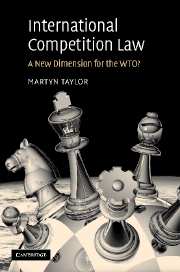Book contents
- Frontmatter
- Contents
- List of tables and figures
- List of abbreviations
- 1 Introduction
- PART I An International Competition Agreement is Desirable
- PART II The WTO Would Provide a Suitable Institutional Vehicle
- PART III The Optimal Form for a WTO Competition Agreement
- 10 What are the optimal objectives and principles for a WTO competition agreement?
- 11 What is the optimal content for a WTO competition agreement?
- 12 What is the optimal structure for a WTO competition agreement?
- 13 Would a WTO competition agreement be politically achievable?
- 14 Conclusion: a plurilateral competition agreement should be incorporated into the WTO
- APPENDIX: Draft negotiating text for a plurilateral WTO competition agreement
- Index
13 - Would a WTO competition agreement be politically achievable?
Published online by Cambridge University Press: 17 July 2009
- Frontmatter
- Contents
- List of tables and figures
- List of abbreviations
- 1 Introduction
- PART I An International Competition Agreement is Desirable
- PART II The WTO Would Provide a Suitable Institutional Vehicle
- PART III The Optimal Form for a WTO Competition Agreement
- 10 What are the optimal objectives and principles for a WTO competition agreement?
- 11 What is the optimal content for a WTO competition agreement?
- 12 What is the optimal structure for a WTO competition agreement?
- 13 Would a WTO competition agreement be politically achievable?
- 14 Conclusion: a plurilateral competition agreement should be incorporated into the WTO
- APPENDIX: Draft negotiating text for a plurilateral WTO competition agreement
- Index
Summary
The WTO will likely suffer from slow and cumbersome policy-making and management – an organisation with more than 120 member countries cannot be run by a ‘committee of the whole’. Mass management simply does not lend itself to operational efficiency or serious policy discussion.
(Jeffrey Schott, Institute for International Economics, 2000)Chapter 13 of this book considers whether a WTO competition agreement would be politically achievable. Chapter 13 has three sections.
Section 13.1 identifies the procedure for incorporating a WTO competition agreement into the WTO and considers whether the public stances of key WTO nations would enable this readily to occur.
Section 13.2 considers likely concessions that could be made to recognise the interests of developing nations given their critical role in determining achievability.
Section 13.3 identifies a four-point incremental strategy for incorporating competition law into the WTO based on the insights identified in this book.
Chapter 13 concludes that a multilateral WTO competition agreement would not be politically achievable at the present time. However, a plurilateral competition agreement may be achievable if the four-point incremental strategy identified in this chapter were adopted.
The negotiation of a WTO competition agreement
The procedure for incorporating a competition agreement into the WTO
In order for a competition agreement to be incorporated into WTO law, it must be incorporated into the Agreement Establishing the WTO (‘WTO Agreement’) which is the formal compilation of all WTO agreements. The procedure for amending the WTO Agreement is set out in Article X.
- Type
- Chapter
- Information
- International Competition LawA New Dimension for the WTO?, pp. 395 - 422Publisher: Cambridge University PressPrint publication year: 2006



